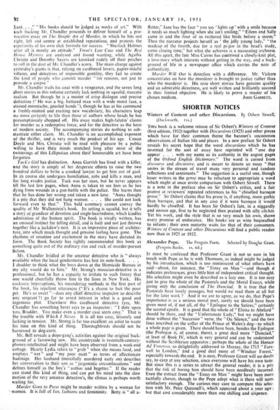Alexander Pope. The Penguin Poets. Selected by Douglas Grant. (Penguin
Books. is. 6d.)
IT must be confessed that Professor Grant is not so sure in his touch with Pope as he is with Thomson, as indeed might be judged by his introduction, which is too reminiscent of what others have said—about, for instance, the " Essay on Man "—and though it indicates preferences, gives little hint of independent critical thought. His selection might even be described as a lazy one. It is too easy just to give the whole of the Pastorals and the Moral Essays, while giving only the conclusion of The Dunciad. It is true that the Pastorals have lovely passages, but would we read them at all but for the later work ? And if we arc to agree, as we do, that Pope's importance is as a serious moral poet, surely we should have been given most of, if not all, of the " Epilogue to the Satires," certainly the second epistle. It is good that the whole of " Eloisa to Abelard " should be there, and the " Unfortunate Lady," but we might have done without the " Successio " verse, the " On Silence," and the two lines inscribed on the collar of the Prince of Wales's dog—to which a whole page is given. There should have been, besides the Epilogue (the Prologue is, of course, there), a great deal more " Dunciad," at least of Book IV, which is very general and can be understood without the Scriblerian apparatus ; perhaps the whole of the Horace Ad Venerem, so delightfully addressed to Murray, the 1715 " Fare- well to London," and a good deal more of " Windsor Forest," especially towards the end. It is easy, Professor Grant will no doubt ' say, to carp at any selection, since everyone will have his own taste. But since this is a series to attract the general reader, it is a pity that the risk of boring him should have been needlessly incurred. Even the extract from the " Essay on Man " might have been more tactfully chosen, though to the Pope adept what is there will seem satisfactory enough. The curious may care to compare this selec- tion with Mr. Peter Quennell's, which appeared about a year ago ; but that cost considerably more than one shilling and sixpence.


































 Previous page
Previous page